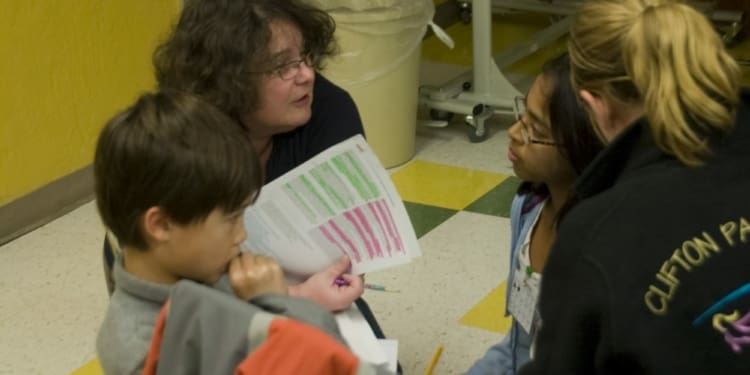Kids may sometimes say the darndest things, but they also can provide an interesting perspective to modern-day problems and struggles. The Craig Elementary School Debate Club held its third debate of the year on Thursday, Dec. 1, when it addressed whether the Internet brings more harm than good. The school’s club was initiated and is overseen by Olga Plotnikov, a parent volunteer. It meets every other Thursday and has about 12 students actively participating. At the end of a debate, the children are paired off into three teams, with one supporting, one opposing and another developing questions during the debate to ask the two teams. Plotnikov said her son, third-grader Dennis, spurred her to look into starting the club to offer a unique opportunity for elementary students. “I have a debater at home,” said Plotnikov. “He inspired me, because at school they don’t have time or resources … to debate and discuss things.” She said critical thinking among children is on a downhill trend compared to the past, so the club provides an outlet for such engagement. The club is in its second year. “It is probably not a real debate like in high school, but they learn how to stand up and speak loudly and make their own point,” she said. While the debate might not be exactly like a high school one, it is structured.
The debate pitted the green team, assigned with arguing the Internet is more harmful than good, against the red team, which provided the opposing viewpoint. Time was allowed to make the points to support arguments and then the opposing team was offered a chance for rebuttal. The yellow team then provided the question-and-answer portion, asking for further explanation or for elaboration on statements made by both teams. Students might not always get their first choice on what team to be on during the debate, but teams rotate, allowing everyone to get a turn at each angle. In between the debates, the students research the issue and prepare to express their positions on the topic. Craig Elementary School Principal William Anders said the club provides an opportunity for younger students that is usually reserved for higher grades. “We know that kids have to learn how to express an opinion, learn how to research. Many children are doing this at a younger age now,” Anders said. “This is a nice forum for them to be able to express that research and that opinion.” He added it helps the students gain confidence in talking in front of their peers, which is an important life skill and can be difficult even for many adults. The two teams’ arguments largely focused on the tradeoff between the Internet’s access to information and its propensity for distraction and even harmful behavior. Aditya, a fifth-grader, said students wouldn’t access inappropriate images and content if they’re looking up information for homework. He said the keywords used when searching online would usually be used for something educational. “Education and being inappropriate are like oil and water. They do not mix very well,” Aditya said. Kamryn, also a fifth-grader, said sometimes other things can be dangerous, such as roads and pens, but it doesn’t mean people need to get rid of them. “That wouldn’t be very reasonable,” Kamryn. “You could stab somebody with a pen, but only if you were misusing it.” Dennis Plotnikov added the Internet could help complete assignments faster, and the higher grade a student is in the more homework they most likely receive. He said his older sister “has like millions of homework.” “If you try to use a dictionary all the time, you have to go to that letter and search in alphabetical order and that takes 20 minutes, not the fast kind of 20 minutes,” Dennis said. “On the Internet … sometimes you can just type in words that are misspelled and it says, ‘Do you mean this?’” When asked, he did concede students need to learn how to spell words.
Rishika Chavali, a fifth-grader, contested the time it takes to use a dictionary. She said the more people use a dictionary, the easier it will get and it is better since people are not at all the computer all the time. Julia Thurn, also a fifth-grader, contested an earlier point made by Aditya and said what if someone couldn’t afford spyware and antivirus software to protect their computer. Then their computer would open to hackers. Aditya said software prices only get lower over time and will be more affordable for people.
Rishika also brought up the recent incident involving threatening videos on the Internet directed at two Niskayuna high school students. She said the students weren’t able to concentrate on their schoolwork following the incident. Kamryn said the video has been deleted from YouTube and nobody can watch it anymore, so problems are dealt with that arise on the Internet. At the end of the debate, Olga Plotnikov, acting as the moderator, summed up points raised during the debate. Poltnikov said the main thing to remember when using the Internet is to be responsible. The next debate will be on whether people should make a New Year’s resolution.
Students take a stance
Young debaters take on Internet dilemmas
Leave Comment



